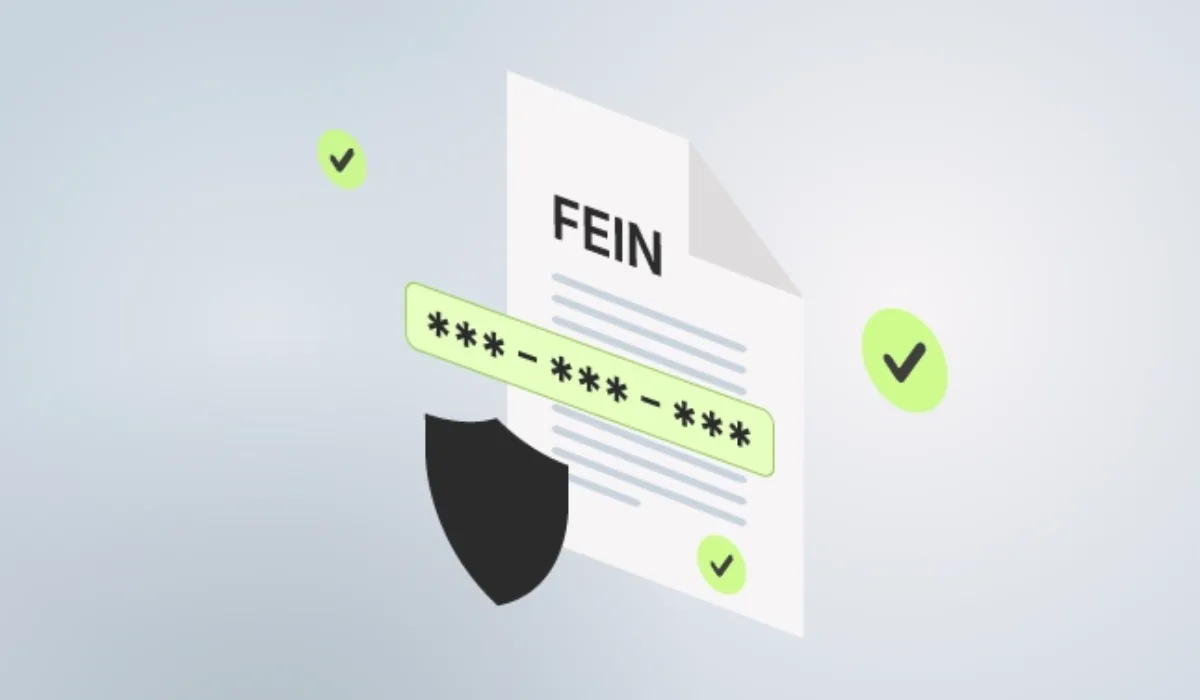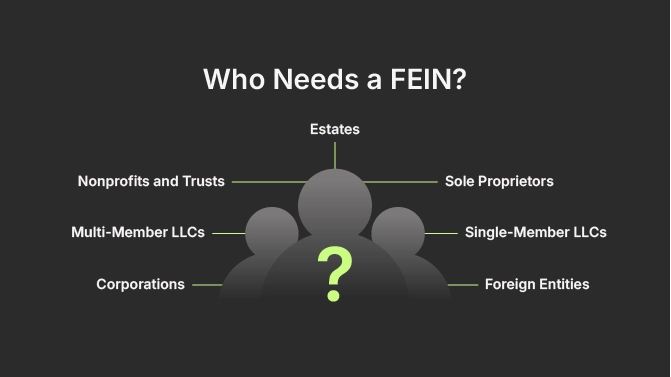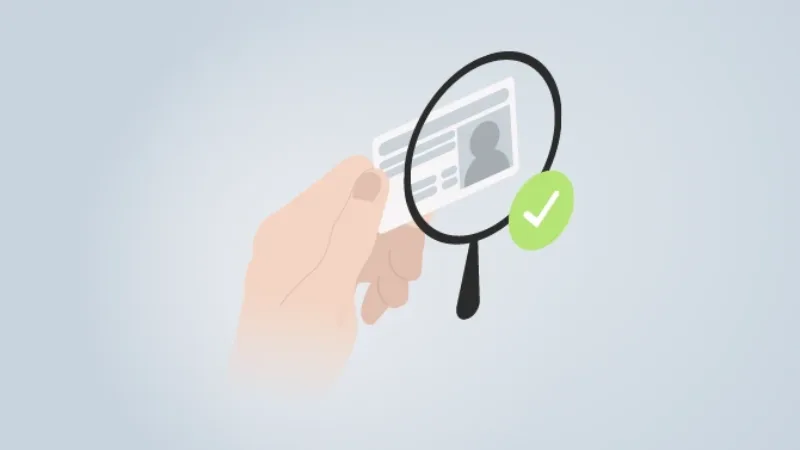Federal Employer ID Number (FEIN) Definition and Who Needs It

Whether you’re launching a startup, scaling a business, or enhancing compliance procedures, your Federal Employer Identification Number (FEIN) is more than just a government-issued number.
At Ondato, we work with businesses worldwide to simplify regulatory compliance. Understanding identifiers like FEIN is foundational to everything from opening bank accounts to verifying corporate entities during AML checks. Let’s dive into what a FEIN is, who needs one, and why it matters in today’s compliance-driven world.
What Is a FEIN Number and Why It Matters for Businesses
A Federal Employer Identification Number (FEIN) (also referred to as an Employer Identification Number (EIN) or Federal Tax ID Number) is a unique nine-digit identifier issued by the Internal Revenue Service (IRS). It serves as a valid taxpayer identification number for business entities and functions much like a Social Security Number (SSN), but for organizations rather than individuals.
The IRS requires a FEIN for filing business tax returns, managing payroll, and handling employment-related tax responsibilities. Often considered a permanent tax ID number, the FEIN links your business to official records for the life of the company, unless significant structural changes occur.
However, the value of a federal employer identification number extends far beyond federal tax compliance. It’s necessary for opening a business account at most financial institutions, establishing an employer account number for state tax purposes, and proving business legitimacy to clients, partners, and regulators. Vendors and compliance platforms also rely on the FEIN to verify company identity and prevent fraud during Know Your Business (KYB) and Anti-Money Laundering (AML) checks.
Having a federal employer identification number isn’t just about filing taxes as it enables trusted, secure business operations. From onboarding new vendors to passing due diligence, a valid FEIN ensures your organization can operate with confidence and transparency.
Who Needs a FEIN?

A wide range of entities require a FEIN, including but not limited to:
Corporations (C-Corps and S-Corps)
Both C-Corporations and S-Corporations are legally distinct from their owners and must report corporate taxes using a FEIN. It’s also required for tasks like opening a corporate bank account, hiring employees, or issuing stock.
Partnerships and Multi-Member LLCs
Because partnerships and LLCs with more than one member must file informational returns and may have employment tax obligations, a FEIN is essential for IRS reporting and business banking.
Nonprofits and Trusts
Charitable organizations and certain types of trusts need a FEIN to apply for tax-exempt status, accept donations, and comply with both state and federal regulations.
Estates
Estates managing a deceased person’s assets often need a FEIN to report income earned by the estate, such as interest, dividends, or property sales during probate.
Sole Proprietors Who Have Employees or Plan to Incorporate
While sole proprietors without employees can use their SSN for verification, those who hire workers, establish retirement plans, or convert into a formal business entity must obtain a FEIN.
Single-Member LLCs
Some single-member LLCs are required to obtain a FEIN if they elect to be taxed as a corporation or if they have employees, even though they are disregarded entities by default.
Foreign Entities Doing Business in the U.S.
Non-U.S. companies operating within the U.S. — whether opening a bank account, hiring staff, or fulfilling federal tax obligations, often need a FEIN to legitimize their activities and meet compliance standards.
When in doubt, consult the IRS FEIN guidelines or your compliance provider. Applying unnecessarily is harmless, but failing to obtain one when required can result in penalties or delays.
Business Processes That Require a FEIN
To make it easy, here’s a checklist of business activities where a FEIN is not just helpful — it’s required:
Hiring employees
A FEIN is mandatory for reporting employment taxes, filing payroll forms, and issuing W-2s to staff. Without it, you can’t legally hire or compensate employees.
Opening a business bank account
Most financial institutions require a FEIN to verify your business identity before allowing you to open a corporate or commercial bank account.
Applying for business licenses
Local and state governments often request a FEIN as part of the business license or permit application process, especially for regulated industries.
Filing federal and state tax returns
Businesses use their FEIN when submitting corporate tax filings, sales tax reports, and other federal or state documents to ensure accurate tracking and accountability.
Setting up a retirement plan (401k, etc.)
To sponsor employee retirement plans like a 401(k), your business must have a FEIN for plan registration and IRS reporting purposes.
Applying for credit under the business’s name
Lenders and creditors typically require a FEIN to assess your business’s creditworthiness and separate its financial profile from your personal credit.
Working with suppliers or clients that require tax forms (e.g., W-9s)
Vendors and clients often request your FEIN on W-9 forms so they can report payments made to your business, ensuring IRS compliance on both ends.
Incorporating or forming a legal business entity
When registering a corporation, partnership, or multi-member LLC, a FEIN is one of the first requirements after state formation documents are filed.
Managing payroll and issuing W-2s or 1099s
You’ll need a FEIN to report wages paid, withholdings, and independent contractor payments to the IRS and state tax agencies.

FEIN in Compliance and Risk Management
A valid FEIN is more than a requirement to prevent tax evasion. For financial institutions and regulated industries, FEINs help verify corporate identity and support Know Your Business and Ultimate Beneficial Owner (UBO) checks.
At Ondato, we use FEINs alongside other identifiers (like business registration numbers) to:
- Confirm entity legitimacy
- Flag discrepancies or mismatches
- Cross-check sanctions and PEP databases
- Support real-time onboarding for B2B clients
An incorrect or mismatched FEIN can raise red flags during AML procedures and slow down due diligence processes.
How To Get a FEIN — Step-by-Step
Applying for a FEIN is free, fast, and usually completed in just a few minutes. Here’s how to do it through the official IRS platform:
- Go to the IRS EIN Application Portal
Start by visiting the IRS EIN Online Application Portal. This is the only official site to apply directly — no third-party service is needed. - Click “Apply Online Now”
Once you’re on the portal, click the „Apply Online Now” button to begin the application process. The system is available Monday to Friday during specific IRS business hours. - Choose Your Entity Type
You’ll be prompted to select the legal structure of your business (e.g., LLC, Corporation, Sole Proprietorship, Trust, Nonprofit). Choose the one that reflects your current or intended formation, as this determines how your application is processed. - Provide the Responsible Party’s Name and SSN or ITIN
The responsible party is typically the business owner or principal officer. Their Social Security Number (SSN) or Individual Taxpayer Identification Number (ITIN) is required for identity verification. - Complete Your Business Details
Enter your business name, physical address, start date, reason for applying, and details about your industry. Be as accurate as possible to avoid issues with IRS correspondence or future compliance checks. - Submit and Receive Your EIN Instantly (in Most Cases)
Once all information is entered and reviewed, submit the application. If everything checks out, you’ll receive your FEIN immediately in a downloadable confirmation letter (Form CP 575).
For International Applicants:
Businesses without a U.S.-based responsible party or SSN cannot use the online portal. Instead, complete and submit Form SS-4 via fax or mail to the IRS. Processing can take several weeks, so plan accordingly.
Tip: Always save a digital and physical copy of your FEIN confirmation letter. You’ll need it when opening bank accounts, applying for licenses, or completing compliance checks.
When You Might Need a New FEIN
You typically only need one FEIN per business. However, the IRS requires a new one if:
- The business structure changes significantly (e.g., sole proprietorship becomes a corporation)
- There’s a merger or acquisition
- A new partnership is formed
- Bankruptcy proceedings start that require a trustee to be assigned
Minor updates like a business address change don’t require a new FEIN.
FEIN vs EIN vs SSN vs ITIN: What’s the Difference?
| Identifier | Purpose | Issued By | Used For |
| FEIN/EIN | Business ID | IRS | Tax filings, compliance, KYB |
| SSN | Individual ID (U.S. citizen) | SSA | Personal taxes, employment |
| ITIN | Individual ID (non-citizen) | IRS | Tax reporting without SSN |
| TIN | Umbrella term (SSN, EIN, ITIN) | IRS/SSA | Generic tax identifier |
FEIN and EIN are used interchangeably. SSNs and ITINs are for individuals — FEINs are for entities.
Is Your FEIN Public? Privacy & Risk Considerations
While the IRS does not maintain a searchable public FEIN database, FEINs are often visible on:
- Filed public documents (like SEC filings)
- Business licenses or permits
- W-9 forms shared with vendors
- Corporate registries in some states
This partial visibility means bad actors can potentially use FEINs in scams or identity fraud. Businesses should treat FEINs as sensitive identifiers, not quite as private as an SSN, but not openly shareable either. Using secure platforms (like Ondato) helps manage exposure and monitor misuse.








